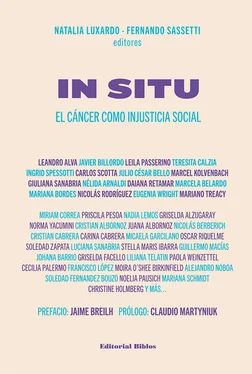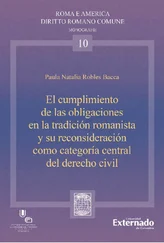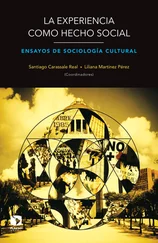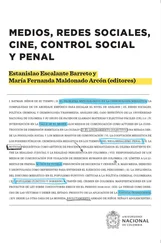WING, S. (2016), “Science for reducing health inequalities emerges from social justice movements”, New Solutions. A journal of environmental and occupational health policy , 26 (1).
*Una primera versión reducida de este capítulo ha sido publicada en S.E. Sustas, S.A. Tapia, M.P. Venturiello, (comps.), Investigación e intervención en salud , Buenos Aires, Teseo, 2020.
**Candela Heredia es trabajadora social. Becaria doctoral Conicet en el Doctorado de Antropología (UBA). Instituto Gino Germani. candelaheredia@gmail.com.
Cecilia Palermo es socióloga. Becaria doctoral UBA en el Doctorado de Ciencia Sociales. Instituto Gino Germani. cecipalermo@gmail.com.
Javier Billordo es licenciado en Bioingeniería (Universidad Nacional de Entre Ríos). Casa de Atención y Acompañamiento José D. Rodríguez. javierbillordo12@gmail.com.
Eugenia Brage es doctora en Antropología (UBA). Centro de Estudios de Metropole (CEM). Universidade de São Paulo. eugebrage@gmail.com.
Leandro Alva es licenciado en Enfermería Comunitaria. Enfermero en el Centro de Salud Gobernador Uranga, Aldea Brasilera (Diamante, Entre Ríos). leandroalva@yahoo.com.ar.
Teresita Calzia es licenciada en Trabajo Social por la Universidad Nacional de Entre Ríos. guadalupecalzia@hotmail.com.
Virchow and Social Medicine: A Trail of Thoughts
Christine Holmberg*
In the discussion of the causes of this epidemic [typhus in Upper Silesia] I came to the conclusion that the worst of the causes were the social situation and that this situation was only changeable through profound social reforms.
Rudolf Virchow, Zur Erinnerung
“Virchow is always with us” was the statement of a leading German physician during a podium discussion, when asked by the author of this article about how social inequities may play out in rural health care. I use this piece on Virchow and his influence in Germany as a think piece, and sketch to begin reflections on social medicine in Germany. I think of this as a series of thoughts that is not – yet – an attempt of an academic analysis.
In this trail of thought I follow the idea that the above anecdote reveals something profound about the relationship between clinical medicine and social medicine in Germany, and perhaps in Europe more generally. These thoughts should not be misunderstood as an attempt to be a comprehensive investigation of Rudolph Virchow’s ongoing influence in medicine, nor does it aim to provide a deep analysis of social medicine in Germany. Rather, it takes as its point of departure the aim of putting forth some sketchy reflections on how Rudolf Virchow’s legacy may in fact be hindering a more profound spread and influence of social medicine in the 21 stcentury and its eventful history (Porter, 2006; Adams et al ., 2019).
In what follows, I do not claim to be scientifically sound. In fact, I admit that I use the broadest of brushes to paint but a simplistic picture of the history of science and medicine. The effort comes, however, from a feeling of unease that social medicine seems to be lingering with (some of) Rudolf Virchow’s ideas, and has therefore missed the influence of more contemporary critical social sciences and lacks behind in an academia of social medicine. For example, the profound engagement in rethinking relations and connections of concepts such as nature and culture, and a focus on the deep intertwinement of the social in the natural and the individual in the social web of significance are a few of the theoretical strands that seem curiously absent in academic social medicine. Thus, what follows is a re-reading of some of Rudolf Virchow’s thoughts, and their connection to current research activities in medicine. What it is not – yet – is a research program into social medicine in the 21 stcentury (in Germany).
Rudolf Virchow was a German physician who lived from 1821 to 1902. He is credited as one of the founders of modern pathology and cell theory. As such, he is also one of the key figures who turned the healing arts into ‘modern, scientific medicine’ during the 19 thcentury, for which the laboratory and the anatomic theatre stand as symbols. Observation and experimentation were established as the paradigm of modern medicine, and remain so to this day.
The disciplines of ethnology and anthropology also claim Rudolf Virchow as a founding figure. His biographer Ackerknecht has consolidated this legacy in the English-speaking world (Ackerknecht, 1981), and Rudolf Virchow Awards are given by both American and German (medical) anthropology associations (Society for Medical Anthropology, 2018; Berliner Gesellschaft für Anthropologie, Ethnologie und Urgeschichte , 2018). His reputation as an anthropologist comes from his late works in archaeology, but is also based on his early report on the causes of a typhus epidemic in Upper Silesia, which he had been asked to carry out for the Prussian government (Virchow, 2012). His travel to the region and the investigation he undertook had a profound impact on him. In his own and other accounts of his life, it was this experience that turned his interest towards politics. He was shocked by the lethargy and hopelessness that he saw among the population of Upper Silesia, something for which he held regional politics responsible (Andree, 2002; Federsen, 2010).
To understand the situation in Upper Silesia, he conducted a comprehensive study, including observations of agricultural conditions, climate conditions, the cultural, ethnic, and linguistic features of the regional population, the living conditions, the role of the church, and the school system (Andree, 2002). From today’s perspective, this could be termed an anthropological investigation. In his report, Virchow elaborated on the social and political causes of the typhus and hunger epidemic.
Based on his experiences in Upper Silesia and his scientific arguments regarding the social and political origins of disease, he eventually expanded his activities to become a politician. Starting in 1859, he began to use his influence to help shape Berlin politics. As a politician, he turned his attention to the living conditions in Berlin, and successfully lobbied for a sewage system and for the collection of mortality and morbidity statistics, and had a special focus on schools as a place to improve health.
Social medicine, as envisioned by Virchow and others, has had a profound impact on health care delivery in Germany. Germany has almost universal health coverage, with a generally well-functioning health care system that offers access to care for most inhabitants. Germany’s health care system is one of the oldest established health care systems in the world. Initiated by Bismarck’s social laws in the late 19 thcentury, the contemporary health care system is run on the basis of mandatory health insurance. The system is founded on a range of principles which aim to minimize the socioeconomic impact of sickness (Simon, 2016). Two principles are crucial here: the principle of solidarity and the principle of coverage. Solidarity means that payment to the public health care insurance companies is based on income, with equal shares paid by the employer and employee regardless of the risk profile of the insured. The second principle of coverage ensures that all medically necessary treatments are given in a cost-effective manner to the insured. Here, however, is a first node of conflict, since ‘cost-effective manner’ is a widely contested and rather vague concept. A third principle in the German health care system is relevant from a social medicine perspective: the subsidiarity principle. This suggests that an individual should first care for themselves, while solidarity from the larger community is asked when the individual cannot cope.
Читать дальше












